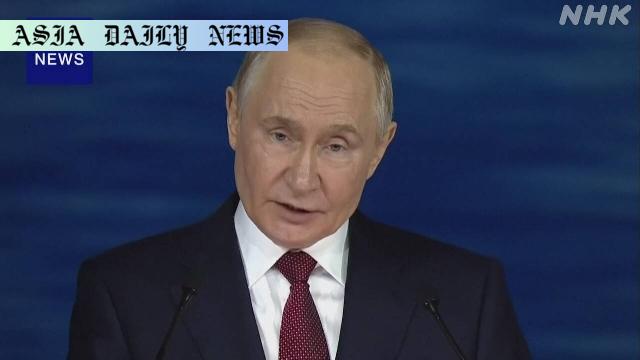Weapons Development: Russia plans enhanced military-technical cooperation with friendly nations, focusing on joint development and innovation.
Russia’s defense industry is expanding weapons output significantly.
Putin emphasizes joint arms development with friendly nations.
Moscow hints at continued military action in Ukraine’s border areas.

Russia’s Defense Industry: A Growing Powerhouse
Russian President Vladimir Putin has announced ambitious plans for the country’s defense industry amid the ongoing geopolitical challenges. Speaking at an international economic forum in St. Petersburg, Putin emphasized the significant strides Russia has made in its military-industrial complex. According to the president, the defense industry has not only increased its production capabilities but is also spearheading the development of groundbreaking military equipment and technologies. This evolution is crucial, given Russia’s continued presence on the global stage as both a major economic and military power.
Putin highlighted that the sector’s growth has not been static but has achieved what he described as ‘good momentum.’ This, he elaborated, includes a multifold increase in production output and the introduction of innovative weapons systems. Against the backdrop of ongoing sanctions and geopolitical pressures, Russia’s ability to sustain and grow its defense capabilities could act as a critical lever for its negotiation and strategic positioning.
Strengthening Bonds with Friendly Nations
A major theme in Putin’s address was fostering and enhancing military-technical cooperation with what he termed ‘friendly nations.’ The explicit aim is to venture into areas like joint arms development, mutual training programs, and the establishment of complete production facilities in partner countries. This multidimensional approach not only allows Russia to bypass certain geopolitical hindrances but also caters to the specific defense needs of its allies, ensuring mutually beneficial partnerships.
The creation of such ‘turnkey enterprises,’ as mentioned by Putin, carries multiple implications. Firstly, it enables friendly countries to develop indigenous capacity for defense production. Secondly, it establishes long-term partnerships by aligning their defense and military infrastructure strategies with Russia’s expertise.
Considerations for the Ukrainian Conflict
Interestingly, Putin’s speech also touched upon the Ukrainian conflict’s strategic aspects. Specifically, he mentioned the possibility of extending Russian military operations beyond eastern and southern Ukraine to regions like the northeastern city of Sumy. While he stated that Russia does not have the explicit ‘goal’ to take the city, the acknowledgment of this possibility underscores the ongoing fluidity of the conflict. This announcement can be interpreted as a signal to Ukraine and its allies, reflecting both Russia’s readiness to scale operations and its territorial approach to areas near its border.
Such remarks hold significant implications for global observers, as they provide a lens into Moscow’s potential future war strategies and geopolitical reasoning. Coupled with announcements about strengthening military ties with global allies, these comments lay the groundwork for a more interconnected and perhaps influential Russian defense ecosystem in the years to come.
Broader Implications for Global Security
The ramifications of Russia’s increased focus on weapons development and strategic partnerships extend far beyond its immediate interactions with allies. For one, this shift could reshape the global arms trade and military alliances, as Russia positions itself as a key supplier of advanced military systems. Moreover, by offering comprehensive production capabilities and turnkey solutions, Russia may attract new partnerships, particularly from nations seeking to bolster their own defense systems without complete reliance on existing superpowers like the United States or NATO-aligned manufacturers.
These developments could lead to new power dynamics in international relations and further complicate the ongoing tensions between major global blocs. As countries align with Russia for strategic military collaborations, this could occasionally run counter to Western interests, triggering new avenues for geopolitical contention.



Commentary
The Strategic Importance of Russia’s New Plan
Russia’s intent to deepen its military-technical cooperation with friendly nations is a bold and calculated move that warrants attention. By prioritizing arms development partnerships, Russia is solidifying its position as a major player in the global arms trade while simultaneously fostering alliances in a way that strengthens its political influence worldwide. It’s a strategy that addresses both immediate military needs and long-term geopolitical aspirations.
Implications for International Relations
One of the most intriguing aspects of this move is its potential to upset the existing status quo. Politics and alliances on the global stage are often intertwined with the trade and manufacture of weapons. As Russia builds turnkey enterprises in partner countries, these nations could potentially reduce their reliance on traditional Western allies for defense equipment. This shift, while seemingly technical, could lead to broader political realignments, creating opportunities and challenges for nations on opposite sides of the political spectrum.
A Glimpse into the Future
This development raises numerous questions about Russia’s endgame. Is this a deliberate tactic to counteract the pressures of economic sanctions, or is it part of a broader long-term strategy to reshape global power dynamics? Either way, it’s clear that Russia is playing the long game, using its defense industry as a key tool for influence. While the ethical and moral implications of fostering such alliances deserve debate, it’s evident that this strategy positions Russia as a resilient and adaptive power capable of leveraging its resources effectively in challenging times.